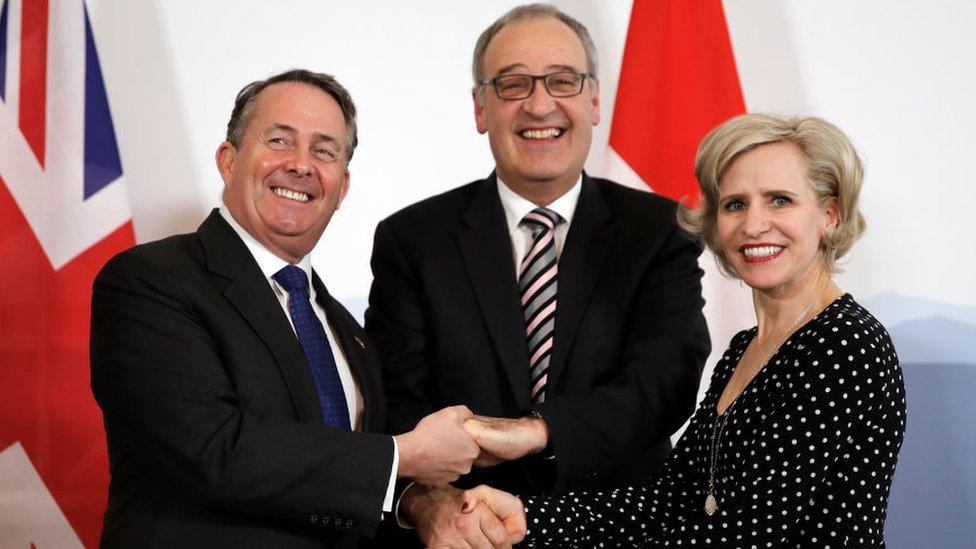Week ahead in Parliament
- Published
- comments
MPs voted against Brexit - again.
It's another quiet looking phoney-war week, as many parliamentarians ignore the cancellation of their normal half term, and head off for a break regardless.
Meanwhile both Houses of Parliament chomp their way through an uninspiring agenda of mostly uncontroversial detailed legislating, plus occasional general debates, with the only spice likely to come from urgent questions or ministerial statements.
PM sticks to Brexit strategy amid Tory row
There are very few select committee hearings and no contested votes are expected in either House.
It will, at least, give the various parties and Brexit factions (some of which look increasingly like parties in their own right) a chance to digest Thursday's clutch of Brexit votes, and refine their calculations about the greater votes yet to come.
Here's my rundown of the rather thin parliamentary week ahead:
Monday 18 February
Commons business opens (2.30pm) with an hour of Defence questions, and in normal weeks this is usually followed by the regular clutch of post-weekend ministerial statements and urgent questions inspired by stories in the Sunday papers.
Defence ministers will probably remain in their seats, however, because then the Commons will vote on the Draft Armed Forces Act (Continuation) Order 2019, the annual vote required to authorise the existence of the armed forces.
This is followed by a couple more orders and regulations - the Draft Public Order, Disclosure of Information and Co-operation (Financial Services) (Amendment) (EU Exit) Regulations 2019, which will allow UK financial regulators to continue to share confidential information with their counterparts in the EU and beyond, after Brexit.
Then come the Draft Money Market Funds (Amendment) (EU Exit) Regulations 2019 - which restricts the assets in which MMFs may invest and impose requirements on liquidity, valuations, stress testing and transparency. Finally there is the Draft Cross-Border Mediation (EU Directive) (EU Exit) Regulations 2019.
Then MPs move on to a general debate on serious violence - there has been a lot of pressure for a debate on this issue from, amongst others Labour's Vernon Coaker.
In the Lords (2.30pm) questions to ministers cover Brexit (of course), the impact on children's health of vehicle air pollution and the recording racist incidents in schools as recommended in the Stephen Lawrence Inquiry report, external.
And then peers are back to processing another battery of orders and regulations. They face eight SI approval motions: on Northern Ireland ministerial appointments; then two on data protection charges, privacy/electronic communications; and one on equivalence determinations for financial services; followed by three (to be taken together) on official listing of securities; benchmark; and packaged retail and insurance-based investment; then a final one on public record disclosure.
Tuesday 19 February
The Commons opens (11.30am) with Health and Social Care questions. The day's Ten Minute Rule Bill, from the Conservative, Bill Wiggin, would bring in a ban on the consumption of dog meat. This is a subject which cropped up in prime minister's questions the previous week, and will be the subject of a backbench debate in Westminster Hall on Thursday.
After that, it's back to Brexit statutory instruments, starting with the Draft European Structural and Investment Funds Common Provisions and Common Provision Rules etc. (Amendment) (EU Exit) Regulations 2019, which dis-apply some EU regulations on European Structural and Investment Funds and also ensures that projects supported by these funds can continue under the government's funding guarantee.
Next is the order on the annual uprating of the National Minimum Wage which will see the National Living Wage (25+) rise from £7.83 per hour to £8.21 (or 4.9%) while the National Minimum Wage rises from £7.38 to £7.70 for 21 to 24-year-olds, and raises the rates for younger workers and apprentices.
Finally, there is the Draft Medicines for Human Use (Clinical Trials) (Amendment) (EU Exit) Regulations 2019, which brings EU regulations on clinical trials into UK law.
And when all those are transacted MPs move onto another subject they have been keen to discuss, the NHS (England) Ten Year Plan, external.
NHS plan: What it means for you
In Westminster Hall, subjects for debate include: the costs and benefits of free childcare (9.30am); and the funding of Merseyside Police (2.30pm) where local MP Stephen Twigg says government funding has been cut by more than £90m since 2010, resulting in the loss of almost a quarter of its police officers while overall crime has risen by 12%.
The 4.30pm debate, led by Labour MP Caroline Flint, is on transport for towns - she aims to highlight the importance of good transport in revitalising post-industrial towns, and research from the Joseph Rowntree Foundation showing that unaffordable and unreliable public transport is cutting off the poorest families in the north of England from crucial job opportunities.
She wants to push the government to reflect on this underinvestment in transport for towns, particularly in the north of England.
In the Lords (2.30 pm), peers should conclude their detailed consideration of the Organ Donation (Deemed Consent) Bill - the report stage should not take very long because there seem to be no amendments, so Labour's Lord Hunt of Kings Heath should soon see it into law.
But more controversy does await, with the first day of committee stage for the Healthcare (International Arrangements) Bill, with the newly anointed Health Minister Baroness Blackwood in charge.

The bill is supposed to replicate the UK's existing reciprocal healthcare arrangements, but some peers fear the government is using it to "go global" in health care, allowing the health secretary to make agreements with countries across the world on whatever terms he chooses.
A second issue is the sweeping "Henry VIII powers, external" to amend or revoke primary legislation and retained EU law. The Lords' highly-influential Delegated Powers and Regulatory Reform Committee said these were of "breath-taking scope.... Indeed the scope of the regulations could hardly be wider".
There is also a suspicion that the bill could be used to open up NHS providers to foreign competition under new free trade agreements - echoing the earlier concerns about the now-defunct TTIP trade agreement.
Finally, there will be a short debate commemorating the 100th anniversary of the Amritsar massacre.
Wednesday 20 February
The Commons day begins (11.30am) with half an hour of Scotland questions, followed at noon by what may be an rather under-populated Prime Minister's Questions, with many MPs absent.

Prime Minister's Questions: The verdict
The day's Ten Minute Rule Bill is the Asylum Seekers (Permission to Work) Bill from the Labour MP Catherine West.
She wants to end the ban on asylum seekers working, arguing that it is both a great social injustice, and economically illiterate.
She says an asylum seeker receives £5.39 a day to live on - an allowance that needs to cover clothing, transport, food, personal hygiene and often the cost of their asylum application, which can take years to process.
While they're left struggling to support themselves and their families, the government is wasting the talents of thousands of people. Giving asylum seekers the right to work after they have waited for six months allows them to use their skills and live in dignity, Ms West says.
Then it's back to Brexit-related Statutory Instruments: the Draft Motor Vehicles (Compulsory Insurance) (Amendment etc.) (EU Exit) Regulations 2019; the Draft Aquatic Animal Health and Alien Species in Aquaculture (Amendment) (Northern Ireland) (EU Exit) Regulations 2019 and the Statutory Instrument relating to the Draft Fertilisers and Ammonium Nitrate Material (Amendment) (EU Exit) Regulations 2019.
The main debate is on anti-Semitism in modern society - which may be the most highly-charged debate of the week. The intervention last week of the Labour deputy leader, Tom Watson, to condemn anti-Semitic attacks on his party colleague Luciana Berger, demonstrated how high-profile this issue has become.
Finally, the Conservative Luke Hall has an adjournment debate on horse tethering - he supports the Bristol-based charity HorseWorld's, #BreakTheChain anti-tethering campaign and warns that dangerous tethering practices can leave horses mentally and physically scarred.
He is calling for a ban on tethering in unsafe places such as on roads or roundabouts, or for a period of time that exceeds 24 hours.
In Westminster Hall, debates include another debate on police funding (9.30am) with Labour MP Grahame Morris highlighting the impact of grant cuts on Durham Constabulary, where police officer numbers have been cut by a quarter.
The Conservative Sheryll Murray has a debate on the UK deep sea mining industry (11am); and Labour MP Carolyn Harris discusses the recall of women to prisons (2.30pm) - she says that in the last year more than 1,700 women have been recalled to prison, with a detrimental effect on the women themselves, their children and their wider families.
She wants the government need to re-evaluate the measures that are in place for women post-custody in order to significantly reduce the number who are unnecessarily recalled to prison and allow them to resettle and return to family life.
The next debate (4.30pm) sees the Conservative Trudy Harrison highlights the potential of producing more small modular nuclear reactors - which she argues could be the key to the UK's nuclear future, helping to meet the government's objective of a 30% reduction in the cost of new build.

On the committee corridor, the Joint Committee on Human Rights , externalembarks on its latest inquiry, into children whose mothers are in prison (3.15pm) with witnesses from the Magistrates Association, and the Prison Reform Trust.
In the Lords (11am), questions to ministers include one on compliance with human rights law on the 10-year limit for storing frozen eggs under the Human Fertilisation and Embryology Act and another on the number of bills and statutory instruments which need to be passed by Parliament before Brexit day.
Then there are another eight SI approval motions: on the Armed Forces; judicial pensions; and Cross-border Mediation (EU Exit); followed by two (to be taken together) on road vehicles, mobile machinery, and emission performance standards; and three on drivers' hours and tachographs; motor vehicles compulsory insurance; and on merchant shipping.
Thursday 21 February
The Commons day begins, (9.30am) with 40 minutes of Environment, Food and Rural Affairs questions, followed by questions to the MPs who speak for the Church Commissioners, the House of Commons Commission, the Public Accounts Commission and the Speaker's Committee on the Electoral Commission.

The UK-Swiss agreement signed in Bern on 11 February also applies to neighbouring Liechtenstein
There will be considerable interest in the Business Statement from the Leader of the House, Andrea Leadsom, because the precise arrangements for what promise to be crucial Brexit votes in the following week could be very important.
Then the main debate is on Potential Future Free Trade Agreements - Australia, New Zealand, US and a Comprehensive and Progressive Agreement for Trans-Pacific Partnership.... there has been some pressure for discussion of the UK's post-Brexit trade policy.
In Westminster Hall there's a general debate on the Greater Manchester Spatial Framework, external, followed by that general debate on banning the consumption of dog meat in the UK, led by the DUP's Jim Shannon.
In the Lords (11am), questions include one about the recent changes to access to free school meals following the delay to the roll out of Universal Credit , and after that comes a half day of committee stage consideration on the Healthcare (International Arrangements) Bill - with the expectation that peers will take an early bath by the mid-afternoon.
But watch out for what may prove a ground-breaking amendment from the Lib Dem Lord Marks, who is concerned that peers normally have the choice of accepting or rejecting orders and regulations proposed by the government, and may not seek to amend them.
So he will propose a system which would allow a preliminary debate so MPs and peers could highlight any concerns and perhaps get changes made before they are put before them for formal approval. This may sound rather dry but it could set a precedent which transforms the way this kind of secondary legislation is processed through Parliament.
Neither House sits on Friday 22 February.
- Published30 July 2019

